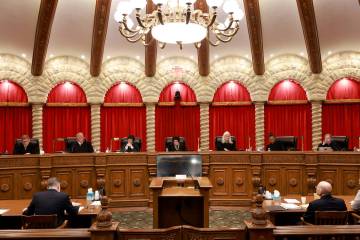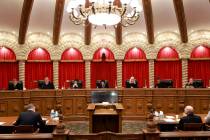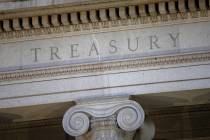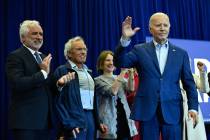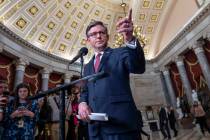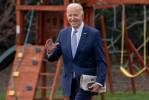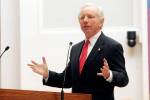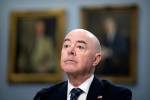Stimulus package passes
WASHINGTON -- In a major victory for President Barack Obama, Democrats muscled a $787 billion stimulus bill through Congress late Friday in hopes of combating the worst economic crisis since the Great Depression. Republican opposition was nearly unanimous.
After lobbying energetically for the bill, Obama is expected to sign it within a few days, less than a month after taking office.
Supporters said the legislation would save or create 3.5 million jobs. House Majority Leader Steny Hoyer, D-Md., conceded there was no guarantee, but he said that "millions and millions and millions of people will be helped, as they have lost their jobs and can't put food on the table of their families."
Vigorously disagreeing, House Republican leader John Boehner of Ohio dumped a copy of the 1,071-page bill to the floor in a gesture of contempt. "The bill that was about jobs, jobs, jobs has turned into a bill that's about spending, spending, spending," he said.
The Senate approved the measure 60-38 with three GOP moderates providing crucial support, the only members of their party to back it. Democratic Sen. Sherrod Brown of Ohio cast the decisive vote after flying aboard a government plane from Ohio, where he was mourning his mother's death.
Hours earlier, the House vote was 246-183, with all Republicans opposed to the package of tax cuts and federal spending that Obama has made the centerpiece of his plan for economic recovery.
Nevadans split along party lines in both chambers of Congress.
In the House, Democrats Shelley Berkley and Dina Titus voted for the stimulus bill while Republican Dean Heller voted against it.
In the Senate, Democrat Sen. Harry Reid, a major architect of the bill, voted for it.
Republican Sen. John Ensign voted against it, after delivering a speech saying he feared that billions of dollars in new government spending will not lift the nation from recession.
The legislation, among the costliest ever considered in Congress, provides billions of dollars to aid victims of the recession through unemployment benefits, food stamps, medical care, job retraining and more. Tens of billions are ticketed for the states to offset cuts they might otherwise have to make in aid to schools and local governments, and there is more than $48 billion for transportation projects such as road and bridge construction, mass transit and high-speed rail.
Democrats said the bill's tax cuts would help 95 percent of all Americans, much of the relief in the form of a break of $400 for individuals and $800 for couples. At the insistence of the White House, people who do not earn enough money to owe income taxes are eligible, an attempt to offset the payroll taxes they pay.
In a bow to political reality, lawmakers included $70 billion to shelter upper middle-class and wealthier taxpayers from an income tax increase that would otherwise hit them, a provision that the nonpartisan Congressional Budget Office said would do relatively little to create jobs.
Also included were funds for two of Obama's initiatives, the expansion of computerized information technology in the health care industry and billions to create so-called green jobs the administration says will begin reducing the country's dependence on foreign oil.
Asked for his reaction to House passage of the bill, Obama said "thumbs up" and indeed gave a thumbs-up sign as he left the White House with his family for a long weekend in Chicago.
There was little or no suspense about the outcome, although the final act played out over hours and extended late into the night.
That was to allow time for Brown to fly back. He cast his vote more than five hours after most senators had left the Capitol for a 10-day vacation, one of the longest roll calls in Senate history.
Congress cast its votes as federal regulators announced the closing of the Sherman County Bank in Loup City, Neb.; Riverside Bank of the Gulf Coast in Florida, based in Cape Coral; Corn Belt Bank and Trust Co. of Pittsfield, Ill.; and Pinnacle Bank of Beaverton, Ore.
They raised to 13 the number of failures this year of federally insured banking companies and were the latest reminders of the toll taken by recession and the frozen credit markets.
The day's events at the Capitol were scripted to allow Democratic leaders to fulfill their pledge to send Obama legislation by mid-February.
"Barack Obama, in just a few short weeks as president, has passed one of the biggest packages for economic recovery in our nation's history," said House Speaker Nancy Pelosi, anticipating final Senate passage.
The approval also capped an early period of accomplishment for the Democrats, who won control of the White House and expanded their majorities in Congress in last fall's elections.
Since taking office on Jan. 20, the president has signed legislation extending government-financed health care to millions of lower-income children who lack it, a bill that President George W. Bush twice vetoed. He also has placed his signature on a measure making it easier for workers to sue their employers for alleged job discrimination, effectively overturning a ruling by the Supreme Court's conservative majority.
Obama made the stimulus a cornerstone of his economic recovery plan even before he took office, but his calls for bipartisanship were an early casualty.
Republicans complained they had been locked out of the early decisions, and Democrats countered that Boehner had tried to rally opposition even before the president met privately with the GOP rank and file.
"A lot of us are afraid this stimulus bill is not going to cure our economic woes," Ensign said in his speech before the Senate vote.
Berkley said there will be "an immediate psychological impact" in Las Vegas now that Congress has acted.
"Several millions of dollars will be flowing into Nevada as soon as the bill is finalized and we can start moving the money," she said.
Assistance to the state government "will probably start flowing almost immediately," she said.
"Help is on the way and people in Nevada are going to know it," Berkley said. "I am optimistic."
Titus said Congress took "bold action."
"With this critical legislation, we are beginning the long and difficult process of restoring our economic security and putting our economy back on the right track," she said.
Reid said: "This recovery package is going to be good for Nevada."
But Heller said by focusing on spending and not enough on tax cuts, the legislation "will prove to be a colossal waste of taxpayer dollars."
"This bill will not jump-start our economy, increase productivity, or create or save jobs," Heller said. "Instead of providing expanded tax relief to help middle class families and small businesses, Congress has determined that big government is the answer."
In retrospect, said White House chief of staff Rahm Emanuel, the White House wasn't "sharp enough" in emphasizing the benefits as Republicans began to criticize spending on items such as family planning services, anti-smoking programs and reseeding the National Mall.
Reid faced a different task: finding enough GOP moderates to give him the 60 votes needed to surmount a variety of procedural hurdles. To do that, he and the White House agreed to trim billions in spending from the original $820 billion House-passed bill, enough to obtain the backing of GOP Sens. Olympia Snowe, Susan Collins of Maine and Arlen Specter of Pennsylvania.
As the final compromise took shape in a frenzied round of bargaining earlier this week, it was trimmed again to hold the support of the moderates, whose opposition to a new program for federal school construction caused anger among House Democrats.
In the end, a compromise was reached that allows states to use funds for modernizing schools.
Stephens Washington Bureau Chief Steve Tetreault contributed to this report.
ENSIGN OPPOSES BILL
Sen. John Ensign on Friday criticized the amount of education money that Nevada could receive as part of the federal stimulus package.
Nevada's nearly $543 million allocation, as estimated by the Congressional Research Service, ranks last in the country per capita, according to Ensign's office.
The junior senator from Nevada said it was one of the reasons why he, along with 37 fellow Republicans, voted against the stimulus package.
"As a result of this so-called stimulus bill, Nevadans will pay higher taxes to subsidize education in other parts of the country," Ensign said in a statement.
Officials are determining the actual amount Nevada will receive for education from the stimulus package, but Ensign spokesman Tory Mazzola said the figure is expected to be close to the service's estimate.
The per-capita estimates show Nevada gets $209 per person for education, while Alaska was allocated $284 per person, the most of any state.
The money includes funding for higher education, according to Mazzola.
Jon Summers, spokesman for Sen. Harry Reid, D-Nev., said he not seen final figures.
"If the Republicans had their way, Nevada wouldn't be getting anything," he said.
The funds are not guaranteed, however. Proposed cuts in school spending in Nevada could cause the state to fall below requirements to receive as much as $400 million in education grants aimed at bolstering stressed states.
If the state falls below the requirements, the stimulus package allows the U.S. secretary of education to waive the limits. Nevada legislators, who face a tough budget year, hope the state will receive such a waiver.
LAWRENCE MOWER LAS VEGAS REVIEW-JOURNAL




